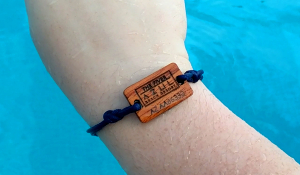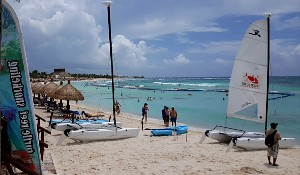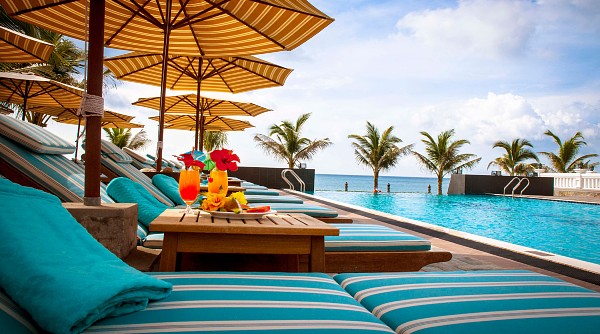All-inclusive resorts are plentiful throughout the Caribbean and Mexico, but you can also find these types of set-ups in other popular holiday destinations as well, including Florida, Arizona, Hawaii, and areas of Europe and Central America.
An all-inclusive destination is often the most convenient choice for a vacation because it reduces the amount of planning. Travelers don’t need to separately budget for and arrange flights, hotels, meals, entertainment, and activities because it’s all wrapped up in one neat little bow and paid upfront. We highlighted several more reasons why this type of vacation is a good choice in our Top 10 Reasons to Choose an All-Inclusive Resort. However, if you are new to this type of experience, there are many things that can lead to a problematic vacation. Read on for our pro tips to avoid disappointment at an all-inclusive resort.
1. Research the Resort Before Booking… and then research some more
 What most people do not know is that many all-inclusive resorts feature more than one resort on the same premises. Each is geared to a different type of traveler — families, couples, and luxury travelers. And each has its own rates, room layouts and decor, and on-site amenities and restaurants… but all interconnected. For example, Bahia Principe Resorts in the Mexican Riviera lists 4 different resorts — 2 family-oriented properties (Coba and Tulum) and 2 luxury properties (Sian Ka’an and Akumal, with an additional option of Akumal Adults-Only), and they are all intertwined. To fully understand this type of setup, read our resort breakdown here.
What most people do not know is that many all-inclusive resorts feature more than one resort on the same premises. Each is geared to a different type of traveler — families, couples, and luxury travelers. And each has its own rates, room layouts and decor, and on-site amenities and restaurants… but all interconnected. For example, Bahia Principe Resorts in the Mexican Riviera lists 4 different resorts — 2 family-oriented properties (Coba and Tulum) and 2 luxury properties (Sian Ka’an and Akumal, with an additional option of Akumal Adults-Only), and they are all intertwined. To fully understand this type of setup, read our resort breakdown here.
Reserving online for an all-inclusive resort can be confusing for travelers because online booking sites often fail to explain that the amenities guests will have access to will depend on the section of the resort they book. And sometimes their photos are out of date or represent the wrong property. So, it’s no wonder that when guests arrive they are perplexed and disappointed.
The best bet is to speak with a seasoned travel agent to help make your decision and obtain the best deal. Or speak directly with the resort. If you are determined to make your own arrangements, research the property thoroughly and its individual resorts before you book, and take into account all the features that will or will not be included with each one. Never trust a Google search for photos of the resort and its room layouts because visitors are known to incorrectly identify the pictures they upload to the web. This is also true of guest photos uploaded to TripAdvisor. It’s best to look directly at the resort’s website or locate current photos on their social media.
2. Find out about the ‘Extras’
 Many all-inclusive resorts go way beyond the inclusion of a few restaurants and activities. Some have such large properties that they include executive golf courses, spas and salons, medical services, ziplining, casinos and nightlife, and a multitude of exciting watersports. In some cases, there is a facility for swim-with-dolphin experiences. Although the resort will advertise these on-site features, it does not mean they are included. So it’s best to find out ahead of time how much extra they will cost if you want to access them.
Many all-inclusive resorts go way beyond the inclusion of a few restaurants and activities. Some have such large properties that they include executive golf courses, spas and salons, medical services, ziplining, casinos and nightlife, and a multitude of exciting watersports. In some cases, there is a facility for swim-with-dolphin experiences. Although the resort will advertise these on-site features, it does not mean they are included. So it’s best to find out ahead of time how much extra they will cost if you want to access them.
Typically, most all-inclusive resorts include non-motorized watersports such as kayaks, paddleboards, and windsurfing equipment. But jet-skiing, parasailing, and motorized boats are pay-as-you-go. Some activities are included, such as dance lessons, poolside fitness, Karaoke, and more. But specialty shows are usually extra. Most restaurants are included and often room service as well. But exclusive dining is almost always extra, such as a romantic dinner on the beach, or a specialty dinner cooked in-suite by a chef. Fitness centers are included, but not the spas and treatments. Golf is included if you have paid for a golf vacation package or if your all-inclusive package includes one round; otherwise, it is pay-as-you-go.
3. Identifier Bracelets
 Upon check-in at an all-inclusive resort, guests are issued a waterproof bracelet that depicts their section of the resort (oftentimes with their guest # on it). This helps staff to identify the amenities that can be accessed by that guest. Never take the bracelet off during your stay and do not pack it to take home as a souvenir; you will be expected to turn it in at the end of your stay. If you lose it during your vacation, report it to the front desk right away so they can issue a solution. If you do not turn in your bracelet at check-out, you will be charged for it and the penalty can be expensive. This is to prevent guests from passing their bracelets along to someone wanting access to features that are not included with their particular package.
Upon check-in at an all-inclusive resort, guests are issued a waterproof bracelet that depicts their section of the resort (oftentimes with their guest # on it). This helps staff to identify the amenities that can be accessed by that guest. Never take the bracelet off during your stay and do not pack it to take home as a souvenir; you will be expected to turn it in at the end of your stay. If you lose it during your vacation, report it to the front desk right away so they can issue a solution. If you do not turn in your bracelet at check-out, you will be charged for it and the penalty can be expensive. This is to prevent guests from passing their bracelets along to someone wanting access to features that are not included with their particular package.
4. Tipping
 Despite booking an all-inclusive vacation, it does not mean that tipping is included. Some all-inclusive destinations include gratuities, but more often than not tipping is appreciated and encouraged. Not only is it good manners, particularly if you’ve had great service, but it can also ensure that you continue receiving great service. Busy bartenders, waiters, shuttle drivers, and housekeeping staff are grateful when acknowledged with a tip and often go out of their way to keep you happy. So, make sure you take several small bills with you on vacation, preferably in the currency of the country you are visiting. US currency is ‘usually’ accepted as well. Keep the bills somewhere safe but also easy to access.
Despite booking an all-inclusive vacation, it does not mean that tipping is included. Some all-inclusive destinations include gratuities, but more often than not tipping is appreciated and encouraged. Not only is it good manners, particularly if you’ve had great service, but it can also ensure that you continue receiving great service. Busy bartenders, waiters, shuttle drivers, and housekeeping staff are grateful when acknowledged with a tip and often go out of their way to keep you happy. So, make sure you take several small bills with you on vacation, preferably in the currency of the country you are visiting. US currency is ‘usually’ accepted as well. Keep the bills somewhere safe but also easy to access.
5. Explore the Resort
 Don’t be afraid to explore the resort thoroughly so you can take advantage of everything you have access to.
Don’t be afraid to explore the resort thoroughly so you can take advantage of everything you have access to.
There’s nothing worse than returning home from vacation and discovering that you missed something you wanted to see or do and it was right at your fingertips without knowing it.
6. Explore the Region
 The very same logic applies to seeing and doing things off the resort property. You can’t truly say you’ve seen Jamaica, for example, if all you’ve seen is the pool, the beach, and your hotel room. Before your trip, find out what adventures and excursions are available in the region and if any interest you. If so, read reviews to locate the best tour operators and prices, and then book in advance if you can. Or, if you wait until you arrive at your destination, oftentimes there is a reputable tour representative available in the lobby. Undoubtedly, you will be approached by locals selling tours on the beach. But for the sake of safety, book with a credible company.
The very same logic applies to seeing and doing things off the resort property. You can’t truly say you’ve seen Jamaica, for example, if all you’ve seen is the pool, the beach, and your hotel room. Before your trip, find out what adventures and excursions are available in the region and if any interest you. If so, read reviews to locate the best tour operators and prices, and then book in advance if you can. Or, if you wait until you arrive at your destination, oftentimes there is a reputable tour representative available in the lobby. Undoubtedly, you will be approached by locals selling tours on the beach. But for the sake of safety, book with a credible company.
7. Preventative Medicine
 Before vacation, consult with your doctor or check the CDC website for recommendations regarding any vaccines or preventative medicine you might need to consider for your destination. For example, is a Twinrix shot recommended for the prevention of Hepatitis A and B? Is the water ok to drink at your destination? If not, consider using Dukoral® before traveling, for the prevention of diarrhea. The fastest way to ruin your vacation is to spend it in the bathroom with an upset stomach.
Before vacation, consult with your doctor or check the CDC website for recommendations regarding any vaccines or preventative medicine you might need to consider for your destination. For example, is a Twinrix shot recommended for the prevention of Hepatitis A and B? Is the water ok to drink at your destination? If not, consider using Dukoral® before traveling, for the prevention of diarrhea. The fastest way to ruin your vacation is to spend it in the bathroom with an upset stomach.
Also, don’t forget to pack simple over-the-counter meds that you might need, such as Tylenol, Gravol, Pepto, antibacterial cream, and some bandaids.
8. Timeshare Presentations
 Many all-inclusive resorts have timeshares on the property, with eager salesmen that are anxious to show guests everything a timeshare can offer. Usually, the sales-pitch presentations come with a promise of a free gift, such as show tickets, tours, and spa treatments. Many people agree to sit through the 1 or 2-hour presentation just for the gift but quickly regret their decision when high-pressure sales tactics become uncomfortable. If you are the type of person that does not mind such an environment and giving up an hour or two of your vacation, it’s a good way to get some freebies. However, if talk of timeshares and aggressive salesmen makes you uneasy, do not get roped in. Firmly say no and walk away.
Many all-inclusive resorts have timeshares on the property, with eager salesmen that are anxious to show guests everything a timeshare can offer. Usually, the sales-pitch presentations come with a promise of a free gift, such as show tickets, tours, and spa treatments. Many people agree to sit through the 1 or 2-hour presentation just for the gift but quickly regret their decision when high-pressure sales tactics become uncomfortable. If you are the type of person that does not mind such an environment and giving up an hour or two of your vacation, it’s a good way to get some freebies. However, if talk of timeshares and aggressive salesmen makes you uneasy, do not get roped in. Firmly say no and walk away.
9. Beach Safety
 If you choose to venture off your resort property by taking a walk along the beach, expect to be approached by locals selling tours, massages, and local crafts and jewelry. Most of the time this is harmless, but do not leave the beach to follow anyone to their vehicle or elsewhere. And do not get their hopes up for a sale if you do not intend to purchase anything. Just smile politely, say no thank you, and keep walking. You might also encounter locals with parrots or other exotic creatures to coax you to have your photo taken. These photos are NOT FREE; the locals expect you to pay for them even if they take them with your camera.
If you choose to venture off your resort property by taking a walk along the beach, expect to be approached by locals selling tours, massages, and local crafts and jewelry. Most of the time this is harmless, but do not leave the beach to follow anyone to their vehicle or elsewhere. And do not get their hopes up for a sale if you do not intend to purchase anything. Just smile politely, say no thank you, and keep walking. You might also encounter locals with parrots or other exotic creatures to coax you to have your photo taken. These photos are NOT FREE; the locals expect you to pay for them even if they take them with your camera.
Most of the beaches in popular tourist destinations are entirely safe during the day, but it’s still wise to keep your wits about you and keep your valuables concealed. If at any time the situation feels uncomfortable, head back to your resort. And never go at night.
10. Stay Alert
 This piece of advice should be taken seriously whenever you may roam — it should be common sense. However, we think it’s worth mentioning, especially if your destination is the Caribbean Islands. Staying alert includes:
This piece of advice should be taken seriously whenever you may roam — it should be common sense. However, we think it’s worth mentioning, especially if your destination is the Caribbean Islands. Staying alert includes:
a) Don’t wander off the resort and into unknown territory, especially at night. If you plan to leave your resort, make sure it’s with a reputable tour company or transfer service, or have the hotel concierge call a taxi for you.
b) Don’t invite strangers into your room. Don’t enter a stranger’s room or venture to their home.
c) Women traveling together should remain together, don’t split up to do things alone. If partying at a club, do not overindulge in alcohol and lose control. Do not go to the ladies’ room or leave the club by yourself.
d) Do not fall asleep on the beach.
e) Do not flash cash, or go to an ATM alone or after dark.
f) Use your room safe to lock up your passport and valuables when you are not using them.
g) Don’t leave valuables unattended on the beach or by the pool, such as your wallet, room key, smartphone, or brand-name clothing items.
h) Refrain from ‘hooking up’ with strange men or women as tempting as it might be. You never know who you’re dealing with or what their intentions are.
i) It’s been known to happen that staff sometimes cross boundaries. Most of the time it’s harmless flirting to make guests laugh, or possibly with the hope of getting extra tips. But there have been random incidents that have become serious. If something happens that makes you uncomfortable, don’t be afraid to report it to hotel management.


